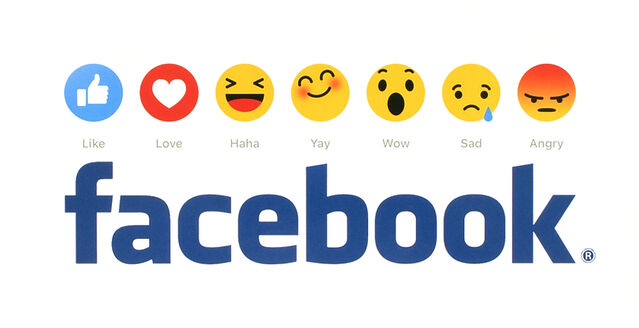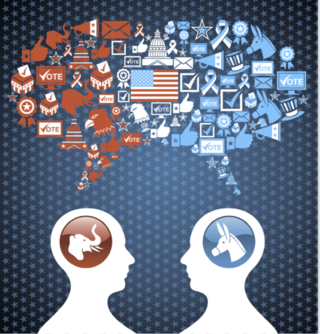Politics
Cyber-Politics on Social Media
To post or not to post? That is the question.
Posted May 28, 2020 Reviewed by Kaja Perina
Facebook is used by approximately 70% of adults. What began as a way to connect and reconnect with family and friends, share birthday announcements and cute kitty photos transitioned into a convenient method of expressing opinions about a variety of issues dear to us and become a foremost source of unreliable information. As of 2020, there are 2.6 billion monthly active Facebook users. Issues that were once considered “personal” are now open and available for public consumption and comment on social media platforms.

This is an election year so maybe it’s not strange that there is such a predilection to political posts. A quick perusal of Facebook posts and comments show that even topics like science, medicine, pharmacology, psychology, epidemiology, health and wellness and finance, are now interpreted as being political.
Let’s take a look at why we often post (engage) in political discourse on social media (Pro) and then why it might not be such a hot idea (Con). Disclosure: I am not an American Citizen; not a Democrat and not a Republican. I am an independent, free thinker. I have friends on both sides of the political aisle.
1) Pro: We love “likes." The immediate gratification we receive from getting positive affirmations (thumbs up, cute heart, “caring” emoji) is worth its weight in gold. It becomes an addiction, giving us a self-confidence boost, even when we don’t know them in real life.
Con: The boost we get is often short-lived, like a cocaine-induced high. We need to keep coming back and posting more. The rapidity with which posts and comments come and go leads to fleeting feelings of success and self-esteem It is not a long-term solution to happiness or thriving.
2) Pro: Politics influences many aspects of our lives. It is often difficult to discuss topics such as finances, jobs, careers, education, religion, and immigration without referring to politics. Even discussions regarding science, medicine, virology, epidemiology, health and wellness, and psychology seem to involve politics. It can become challenging to have an opinion about how you want to lead your life and not express this in such a convenient forum.
Con: You are usually preaching to the choir. Facebook algorithms make sure that you see the types of posts that you will agree with, based on previous engagements and online behavior. You will more likely “like” more posts, stay on the platform longer, and increase Facebook’s profit. Your social influence is limited. A 2016 Pew survey showed nearly half of Clinton supporters didn’t have any friends supporting Trump and one-third of Trump supporters didn’t know anyone voting for Hillary.
3) Pro: Facebook has no word limit and allows comments and photos that fully express how you feel.
Con: All your friends and their friends and contacts also have the freedom to critically comment on your posts.
4) Pro: The fastest way to spread the word to thousands of contacts, as compared to newspapers, magazines, and radio.
Con: Even if your posts and comments were to reach those on the other side of the political aisle, they are unlikely to alter anyone’s beliefs. There is only a small percentage of truly independent voters. With thousands of news stories, social media posts and misinformation it is unlikely your political post or comment will go viral.
5) Pro: This is a great use of your First Amendment rights to freedom of speech.
Con: Facebook is a company that enforces restrictions and hires “fact-checkers” who censor content. You may be lucky and be on the same side as the fact checkers or you may be on the opposing side and have your posts deleted.
6) Pro: You sincerely want to help others make better decisions, including voting. You have a great understanding of the issues and if only they would listen to you, they would agree.
Con: People often vote based on how much they like someone’s face and personality or persona. Stances on issues often get ignored, misrepresented, or overshadowed. You have two chances that your political post will ever create a change in anyone’s voting—slim and none. Life is too short to spend trying to convince non-believers that you have a better understanding of the situation. You are more likely to be annoying then appreciated.
7) Pro: You like to have political discussions…with thousands of “friends” at once.
Con: Facebook is often a few emotional individuals yelling at each other while tens to hundreds of their friends watch from a distance, getting frustrated or angry. There is no social pressure to do conform to group consensus, to respond to new arguments or to act with some semblance of civility. Nothing has to happen in real-time and you may simply ignore or delete whatever you don’t like.
8) Pro: You want to show how right you were. The rival party candidate made a gaffe on TV. You deserve to take advantage of the situation and rub it in the faces of your friends and contacts who support the opposing party.
Con: Most of your friends who disagree will probably never see your post. The ones who agree probably saw the same thing on TV. The more you like, comment and share, the more limited your scope becomes.
9) Pro: Great way to get attention.
Con: Getting attention. It’s one of the fastest ways to land yourself in trouble with Aunt Amy or your boss at work. Posting something against someone’s values could be fatalistic to a healthy client relationship. if you advertise your job on social media, DO NOT make political posts, you never know who is standing in judgment.
10) Pro: Great way to make new friends through bonding over social and political issues of which we share common concerns, principles and ideals.
Con: More likely you will lose “friends” over political issues. Contacts who do not agree with you are more likely to argue, insult, criticize, harass and block or delete you. Online political discussions more often lead to people finding out they have “less in common politically” than they expected (67%) as opposed to 26% who report having “more in common” than previously thought. A Pew study from 2014 found that about 25% of Facebook users have blocked people over political disagreements! A recent survey of over 12,000 U.S. adults showed that 45% of the nation’s adults stopped talking about politics and election news with someone as a result of something they said. Determinates of how likely a person is to block or stop talking to someone included: Party – Liberal Democrats more than Conservative Republicans: 60% vs 45%. This number is up from 2014 (44% vs 31%). The more engaged a person is politics the more likely they are to block someone with whom they disagree (closely follow = 58% vs somewhat closely = 48% vs not too closely = 38% vs not at all = 27%). Also, those who get their news primarily from local TV are less likely to cut off people with differing political opinions than are those who get their news from social media or news websites.

The other day, I was on Facebook and looked at a friend’s page who had posted something political and defamatory about one of the presidential candidates. He followed this up with harsh criticism of anyone who supported that candidate. They also claimed to have NO friends with dissimilar beliefs. Fortunately, they were proven wrong as several of this person’s friends admitted they were supporting the opposing party and candidate. Unfortunately, they were so hurt by the insults, they all defriended this “contact."
Social media platforms can help promote free speech and goodwill. However, recent years have seen the infusion of more politics. Concomitant with this is an increase in hostility, insults and harassment. Almost 70% of Americans reported feeling “worn out” by the amount of news they encounter (Pew Res Center, 2018). A newer survey found that more than 80% of Americans found the tone and nature of political debate has become more negative over the last several years. Half of U.S. adults say talking about politics with people they disagree with politically is “stressful and frustrating.”
In general, we (78%) believe that social media (Facebook, Twitter, YouTube, etc) and the internet (Google, Yahoo, etc) have a responsibility to prevent misuse of their platforms to influence politics. Yet three-quarters of Americans express little or no confidence in these companies to actually do this.
Healthy, productive discussions elevate our deeper understandings and allow us to grow emotionally and intellectually. Before you create a political post, consider your goals, the audience and carefully weigh the potential risks and benefits.
References
John Gramlich: Pew Research Center. 10 facts about Americans and Facebook, MAY 16, 2019
Mark Jurkowitz and Amy Mitchell: Pew Research Center. A sore subject: Almost half of Americans have stopped talking politics with someone, Feb 5, 2020. https://www.journalism.org/2020/02/05/a-sore-subject-almost-half-of-ame…
Pew Research Center. Partisanship and Political Animosity in 2016. Highly negative views of the opposing party – and its members. June 22, 2016.
Hannah Gilberstadt: Pew Research Center. Few Americans are confident in tech companies to prevent misuse of their platforms in the 2020 election. Feb 24, 2020. https://www.pewresearch.org/fact-tank/2020/02/24/few-americans-are-conf…




